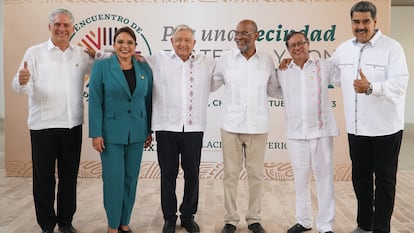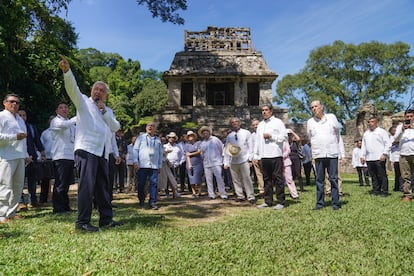Latin American countries urge US to lift sanctions on Cuba and Venezuela to curb migration
Mexico’s president convenes 12 nations for talks on debt reduction and regional cooperation on trade, security and employment


Hosted by Mexican President Andrés Manuel López Obrador, the leaders of 12 countries from Latin America and the Caribbean met in Palenque (southern Mexico) to address the migration crisis and find long-term solutions. Presidents, vice presidents and ministers from the region developed a joint agreement outlining regional commitments and noted that the migration problem is fueled in large part by “coercive unilateral measures” imposed by the United States on various countries, particularly Venezuela and Cuba. The agreement denounced the economic sanctions as “contrary to international law,” which have serious repercussions beyond the target countries. It also specifically called on Cuba and the U.S. to “engage in comprehensive dialogue regarding bilateral relations.”
The joint agreement also proposes that countries be allowed to renegotiate debt with financial institutions to free up resources for domestic investment. “We should propose coordinated efforts to redesign the international financial architecture of sovereign debt. This will help countries, especially middle-income ones, achieve higher levels of development, bridge social gaps and mitigate the forces that drive people to migrate.” The Palenque Summit agreement was signed by Belize, Colombia, Cuba, Costa Rica, El Salvador, Haiti, Honduras, Mexico, Panama, and Venezuela. Ecuador planned to participate but backed out, and representatives of Guatemala’s president-elect attended but did not sign the agreement since Bernardo Arévalo has not yet taken office.
The agreement aims to promote regional trade through tariff reduction, combat transnational organized crime and human trafficking, enhance security cooperation, prioritize the protection of women and children on migration routes, expand official migration mechanisms, collaborate in energy production, and establish a Latin America medicines agency. Mexico also offered technical assistance and expertise in funding programs like Sembrando Vida (Sowing Life) and Jóvenes Construyendo el Futuro (Youths Building for the Future).
The agreement was developed in an hours-long meeting between López Obrador, Gustavo Petro (Colombia), Miguel Díaz-Canel (Cuba), Ariel Henry (Haiti), Xiomara Castro (Honduras), and Nicolás Maduro (Venezuela). Mexican Foreign Minister Alicia Bárcena read the agreement for the press and representatives of other participating nations also read statements. In the meeting, López Obrador noted that the U.S. allocates significantly fewer resources for regional development cooperation compared to its weapons spending. “We cannot just stand by and wait for substantive initiatives from the U.S. government. We have to act ourselves. We can do it — we can help each other,” he said.

The United States and Canada, the two main destination countries for Latin American migrants, were not invited to the Palenque Summit. Mexican government sources told EL PAÍS that both countries asked to attend, but their request was denied. The United Nations was also not invited, despite expressing interest in attending. The goal is to offer a Latin American solution to the migration crisis that will later be shared with the United States and Canada.
During the summit, much discussion revolved around the sanctions against Cuba and Venezuela. Maduro called for the complete lifting of the “criminal and immoral” sanctions imposed by the United States since 2015, saying that “over 930 unilateral measures have crippled the country’s economy.” The Venezuelan president said he received unanimous support during the summit for the “complete, total and permanent” lifting of U.S. sanctions, noting that the recent agreement between the two countries only produced a partial easing. Maduro has directly blamed the economic sanctions for the exodus of Venezuelans, and says many would return home once they are lifted. “Let’s permanently lift all the sanctions on Venezuela. No extortion, no blackmail, no conditions. I promise you that in less than a year, we can turn this whole situation around,” said Maduro.
Cuban Foreign Minister Bruno Rodríguez Parrilla says migration in the region is caused by natural and other “artificial” factors. “First, there’s the economic blockade — a policy that has persisted for over 60 years. It is specifically intended to curtail income and cause poverty and hunger in hopes of provoking political change. Naturally, this leads to more migration.” Rodríguez also claimed the U.S. encourages irregular migration from Cuba by offering “privileged and unique treatment” for political reasons. “Cuban migrants have a higher likelihood of being accepted in the U.S. compared to migrants from other countries if they claim credible fear of returning to their homeland. Cubans know this, of course.” Saying that “the solution is in American hands,” Rodríguez indicated that Cuba is always willing to negotiate regarding the embargo. “If they’re interested in solving the problem, they have the ability to do it. That’s why we accepted the invitation to come here and engage in a comprehensive discussion about relations between our two countries.”
Petro denounces Israel’s response to Hamas attacks
Colombian President Gustavo Petro took advantage of the summit to make a strong statement against Israel’s offensive in the Gaza Strip. Sources in the Mexican government say Petro spent several minutes during a closed-door meeting denouncing the Israeli offensive as genocide, saying the situation in the Middle East is reminiscent of the years preceding World War II when Western countries enabled the rise of Nazism. Petro said Europe in the 20th century tolerated violations of international law, and specifically blamed “white Anglo men” for the war. Petro called on Latin America to support and amplify the legitimate Palestinian voice, rather than silence it. The Colombian president has taken a strong anti-Israel stance, which led to a breakoff in diplomatic relations between the two countries. During the Palenque Summit, Petro pushed unsuccessfully for a joint statement condemning the Israeli offensive in Gaza.
At the end of the summit, Petro spoke to reporters and denounced far-right xenophobia. “When these growing migrant exoduses reach the North, whether in Europe or the United States, they encounter a mentality of fear, as well as racism and xenophobia. This fear often leads to the rise of far-right, xenophobic politicians. The outcome is the collapse of international law that human civilization has built.”
Sign up for our weekly newsletter to get more English-language news coverage from EL PAÍS USA Edition
Tu suscripción se está usando en otro dispositivo
¿Quieres añadir otro usuario a tu suscripción?
Si continúas leyendo en este dispositivo, no se podrá leer en el otro.
FlechaTu suscripción se está usando en otro dispositivo y solo puedes acceder a EL PAÍS desde un dispositivo a la vez.
Si quieres compartir tu cuenta, cambia tu suscripción a la modalidad Premium, así podrás añadir otro usuario. Cada uno accederá con su propia cuenta de email, lo que os permitirá personalizar vuestra experiencia en EL PAÍS.
¿Tienes una suscripción de empresa? Accede aquí para contratar más cuentas.
En el caso de no saber quién está usando tu cuenta, te recomendamos cambiar tu contraseña aquí.
Si decides continuar compartiendo tu cuenta, este mensaje se mostrará en tu dispositivo y en el de la otra persona que está usando tu cuenta de forma indefinida, afectando a tu experiencia de lectura. Puedes consultar aquí los términos y condiciones de la suscripción digital.








































